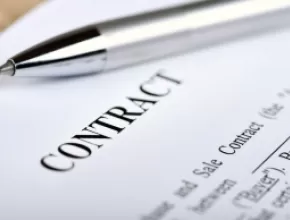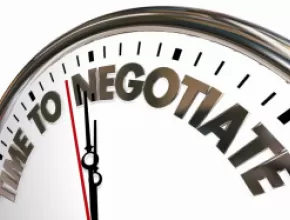Creativity and bundling—meaning signing meeting contracts for multiple programs, preferably over a few years—are the name of the game for meeting planners when negotiating in today’s seller’s market.
That’s the consensus among several hoteliers, meeting buyers and industry attorneys who’ve seen it all when it comes to contracts.
Of course, whether we’re in a seller’s market is still up for debate. After all, as the economy goes, so too goes the industry, and the country is not yet on solid ground. But—again mirroring the nation’s economic situation—some markets have seen big improvements.
“Occupancy has gained momentum and we’re going to see a large shift on average daily rate,”predicts Mark Theis, director of group sales, North America, at Starwood Hotels & Resorts. “Our costs for heat, gas and oil are rising and that’s going to have to be compensated with rate.” In addition, he notes, “At Starwood, especially across the Sheraton and Westin brands, we have done a number of renovations and added new properties within the last three years; there’s a premium that comes with that upgraded inventory.”
Adds Gus Vonderheide, vice president of group sales for Hyatt Hotels Corp., “Not all markets are thriving, there are bubbles and pockets of the U.S—like second and third tier cities—and even international destinations, that haven’t recovered as much as others. But in general, we are selling more rooms than we ever have.”
Healthier hotels mean a more robust industry and that’s ultimately better for meeting planners than being in a field on the decline. But it means negotiating concessions is a tougher road than it’s been in recent years.
“Some things that were on the table have been pulled off, such as free Internet access—whether in guest rooms or meeting space—or things like meeting room rental, meeting set-up and bartending fees,” says Dave Scypinski, senior vice president of ConferenceDirect. “Anything that involves profit has become a sacred cow.”
But there are reasons for that, and planners must understand a hotel’s challenges before sitting down at the bargaining table, contends industry attorney Lisa Sommer Devlin, who typically represents hotels.
“What customers don’t understand is that hotels need commitments, they’re accountable to owners, they have to make forecasts etc.,” she says. “Planners need to know that many hotels out there are over-mortgaged and they don’t have flexibility.”
Understanding where hotels do have flexibility—and what buyers can do to make their salespeople more inclined to help them—is vital to creating a win-win deal, say industry experts.
“We have a general session and, on average, eight breakouts, but I don’t ask for a 24-hour hold so that the hotel can sell space in the evening,” says Sekeno Aldred, events manager at Goodwill Industries. “As a result, sometimes I can get more space for a longer period of time, or maybe a food and beverage discount; because we always spend a lot on that side and I track everything so I have data to back up my request.
“It’s constantly a give and take,” she says.
Adds Vonderheide, “Flexibility on the customer’s side makes a big difference on my flexibility. Especially if that customer can help out with my need dates, like off-season at a resort.”
Or, he wants to tell planners, “‘If you’re willing to use the f&b outlets at the hotel, I can be very flexible with you there too.’”
Negotiations should include the planner asking questions of the hotel, notes Sherry Romello, senior director of Hilton Meetings & Product Management at Hilton Worldwide, and a former planner.
“A hotel salesperson is a great resource for finding out what a hotel’s needs are,” she says. “For example, hotels have less room to negotiate on rate but maybe they can do so on f&b or meeting room rental.”
Others may assume these are among the ‘off-the-table’ items but it varies by market and property, not to mention brand, Scypinski notes.
“Each company has a difference stance on things,” he says. “So the answer to the question ‘what should I try to negotiate on’ is ‘everything.’ The average occupancy throughout most of the country is barely touching 70 percent (see sidebar), so there’s still wiggle room. And it never hurts to ask.”
One thing that could hurt a customer though is a contract without tight performance clauses now that hotels once again are in the driver’s seat, adds Romello.
“As the economy gets tighter, planners won’t have that forgiveness they’ve experience in the last few years,” she says, “so they need to know their group’s patterns and be as spot on as possible.
"A market may have changed since the last time a planner brought a group there," she adds, "so make sure you look through those performance clauses."
Adds Sommer Devlin, “Like it or not, groups that are willing to make a commitment on performance are going to be treated differently than those who are unwilling to do so.”
In addition to directly asking hoteliers about their needs (hot dates, whether they make profit on f&b-because costs there can be high so a reduced guarantee isn’t always possible), another way of getting inside sellers’ minds is getting active in the industry.
“I network with people beyond the actual business, so it’s not just when I’m booking a meeting at someone’s property,” Aldred says. “I’m part of MPI so a lot of time I’m speaking to people just because they’re at an event; and sometimes a supplier will want to help you just because they know your name when you call the hotel,” she asserts.
Another way to work well with hotels is offering to bundle meetings, says Hyatt’s Vonderheide.
“If a customer can sign with us for two or three meetings, I can respond with a very attractive package,” he notes.
Hyatt, as well as other hoteliers, offers planners two concessions if they book two meetings, three concessions for three meetings etc. These can include items such as a welcome reception, a percentage off f&b costs, or complimentary Internet access; or if a planner has unique requests, hoteliers will try to fulfill those. Hoteliers have other suggestions for ‘win-win’ deals.
“If a group can look outside of its traditional rotation pattern—like perhaps it’s only gone to two or three cities in the past—this may be a good time to look at new destinations where we have new product,” Theis says.
Bundling is especially helpful to multi-brand companies like Starwood, he notes.
“If we can cross-leverage across brands, concessions are provided based on total spend with the company.”
The key is for a group to know its needs, says Mike Rowan, national account manager at Experient.
“Even in this day and age with mission statements and ROI, you’d be astonished by the number of groups who say they don’t know when you ask what they’re trying to accomplish,” he says. “You have to look at what your objectives are to know what concessions would mean the most to you.”
And ultimately, Rowan asserts, it’s up to a meeting planner whether to close the deal.
You always have the option of getting up and going someplace else,” he says.





